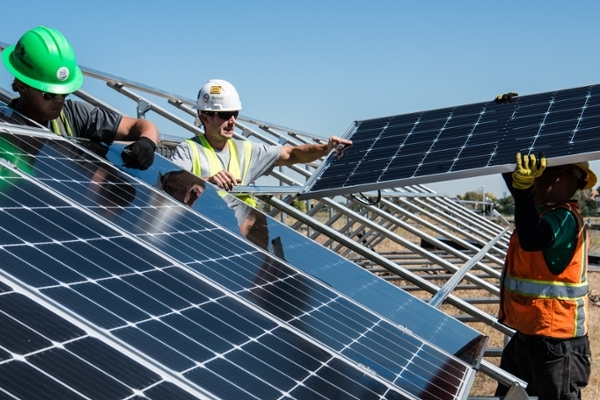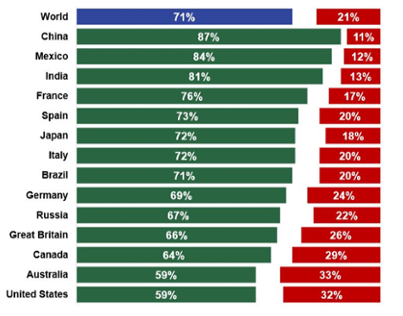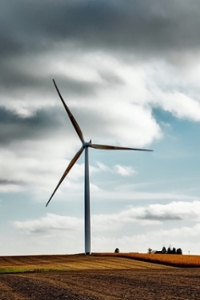
Facing the climate crisis: A post-COVID green energy constructive re-emergence
This issue of JSGS Policy Brief is part of a series dedicated to exploring and providing evidence-based analysis, policy ideas, recommendations and research conclusions on the various dimensions of the pandemic, as it relates here in Canada and internationally.
By Martin Boucher, Faculty Lecturer, Johnson Shoyama Graduate School of Public Policy (JSGS); Christopher Gunter, JSGS Faculty LecturerThat the COVID-19 pandemic will likely have devastating impacts on the global and Canadian economy is well established. Unprecedented public spending at all levels of government, alongside increased business and personal indebtedness is creating the perfect storm for dramatic job losses throughout the country. Recent polling from Angus Reid shows that already nearly half of Canadian households are experiencing COVID-related job losses1.
Governments, and in particular the federal government, have responded with spending packages not seen in generations. It is laudable that governments are giving the attention—and resources—that are needed. All this effort is necessary to flatten the curve and see the other side of this pandemic.
But looming on the horizon is another crisis—climate change. Unlike COVID-19, we have seen this crisis arriving for decades. Let’s not lose sight of the fact there are still actions that can be taken to reduce our GHG emissions. With this pandemic forcing societies to contemplate a new vision, now might be the opportunity for us to pursue a green energy constructive re-emergence with an eye towards a more efficient and prepared future.
COVID-19 impact on GHG emissions
Some note that emissions have been reduced because of COVID-related travel restrictions, business closures, and quarantines. In fact, global emissions are projected to decrease this year. China has already seen emissions decline by a 25 per cent in a single month2. It will likely be similar in Canada. The transportation, oil and gas sectors represent 52% of national emissions3, which are among the hardest hit sectors from the COVID restrictions.
Before we celebrate and claim a climate victory, we should be reminded that emissions are certain to increase significantly as the economy recovers. COVID-19 doesn’t change the fact that we are still a fossil fuel economy. Oil and gas are deeply threaded into our daily lives from the clothes we wear, the energy we use, and even the medical equipment we need now more than ever. At best, the emissions reductions from COVID will likely have a miniscule, but more likely a negligible, change to long-term global emissions. This means we must still be vigilant in our pursuit to avoid the catastrophic impacts of climate change.
Post-COVID support for climate change initiatives
Garnering public support for environmental and climate change initiatives has been a longstanding problem. Could the pandemic make matters worse?
Historically, we know that environmental issues lose public support during times of economic strain—like a recession or depression4. From the day-to-day perspective of a working-class person, the stresses and challenges of everyday life consumes nearly all of their time and energy. How can individuals and families worry about climate change when they are anxious about the increasing lack of stability in the job market, paying bills, childcare, and, at the same time, financially preparing for their own retirement? It is no surprise that they tend to lose focus on pressing environmental issues.
But there is hope that this time is different. Recent Ipsos polling suggest that the public still has an appetite for climate change policy5. According to a poll conducted in April 2020, 64 per cent of Canadians believe that climate change is as serious a crisis as COVID6. If this trend of public support for climate change persists, it would align governments with public opinion to consider a climate-focused jobs plan. Having said that, as shown in the graph below Canada ranked 12th out of 14 nations in terms of a positive response to the assertion: “In the long term, climate change is as serious a crisis as COVID-19 is.”
Figure 1: Country Data: Seriousness of climate change in comparison to COVID-19

What would this look like? Needed are approaches that have co-benefit outcomes of reducing emissions and creating jobs. By happenstance, there are options we are already pursuing that meet these outcomes.
A window of opportunity for renewable energy
COVID-19 may present that long-awaited window of opportunity for renewable energy and energy efficiency. This isn’t a new idea. But as Nobel Laureate economist Milton Friedman has argued, “Only a crisis—actual or perceived—produces real change. When that crisis occurs, the actions that are taken depend on the ideas that are lying around?”
Renewable energy and energy efficiency have been ideas since the OPEC crisis of 1973. Perhaps now is the time to pick them up in a big way.
A key challenge that renewable energy and energy efficiency projects have always faced is the upfront capital costs. A large part is due to the labour-intensive nature of these types of projects. Putting solar panels on your roof, installing insulation in your business, and setting the concrete foundation for a wind project require construction workers, engineers, designers, and business managers. In other words, a local workforce is needed. On a per unit of energy basis, renewable energy and energy efficiency requires significant labour which increases job growth7.
In terms of renewable energy, SaskPower and the Government of Saskatchewan already have a target to reach a 50% renewable capacity by 20308. The goal intends to fill an already existing power supply gap in the province. Now could be the time to consider accelerating and expanding these initiatives.
Tax credits, grants, and low-interest financing could pave the way to unlock this potential. This would be not unlike an eco-retrofit or a cash-for-clunkers program. Businesses and individuals would have the opportunity to better manage the upfront capital costs for renewable energy and energy efficiency projects. To ensure adequate uptake, significant commitment from the provincial and federal governments would be needed.
Given expected financial constraints, how could this be done?
The Green Stimulus Fund

We propose a green stimulus fund at the magnitude of $500 million that draws the combined support of the Canadian and Saskatchewan governments. The target outcomes of the fund—job growth, emissions reductions, and return-on-investment. This approach would include alignment between initiatives at SaskPower, SaskEnergy, and the Government of Saskatchewan. The current piecemeal approach of high efficiency furnace and commercial boiler upgrade subsidies from SaskEnergy9 and renewable energy and energy efficiency support from SaskPower10 would change. The Government of Saskatchewan would serve as the central administrator with an eye on medium and high-return programs and projects. This kind of outcome-based approach would not be without precedent in Saskatchewan. SaskPower’s demand-side management program has flexible and outcome-based measures that allow consumers, predominately industrial, to reduce emissions in a variety of ways.
Saskatchewan is particularly well positioned to benefit from such an approach. Our building and housing stock is inefficient compared to other provinces. Many households and businesses would likely appreciate increased comfort and lower utility bills during our long, cold Saskatchewan winters.
In particular, First Nations communities could benefit tremendously. Our northern Saskatchewan communities are in desperate need of adequate housing. It’s time to think big and consider pursuing an ambitious northern housing strategy, one that provides communities the option to retrofit or build modern, comfortable, well-insulated, and energy-efficient northern homes and businesses.
These options also address a key problem: speed. Renewable energy and energy efficiency projects can be deployed with greater speed than other larger low-carbon infrastructure options (ex. nuclear energy, carbon capture and storage, etc.). This is exactly what we need to bridge the economic divide.
Conclusion
To be clear, accelerating renewable energy and energy efficiency is not the panacea to either of these crises. Vaclav Smil has convincingly argued here in this JSGS Policy Briefs series that the energy transition towards deep decarbonization will be a protracted multi-decadal process11. Renewable energy and energy efficiency are only part of the solution. These are merely examples of co-ordinated and self reinforcing approaches we to reduce emissions and increase job growth. When faced with these challenging times, we must be pragmatic and focus on the outcomes we need. In this case, we need to reduce emissions and produce jobs. As we begin contemplating a society and economy after this pandemic, the time is at hand to seize the opportunity to pursue a constructive re-emergence, in anticipation of our next threat: climate change.
ISSN 2369-0224 (Print) ISSN 2369-0232 (Online)
References
1 http://angusreid.org/covid-19-economic-impact-canada/
4 Scruggs, L., & Benegal, S. (2012). Declining public concern about climate change: Can we blame the great recession? Global Environmental Change, 22(2), 505–515. https://doi.org/10.1016/j.gloenvcha.2012.01.002
6 https://www.ipsos.com/sites/default/files/ct/news/documents/2020-04/earth-day-2020-ipsos.pdf
7 ORNL. (2015). National Evaluation of the State Energy Program: An Evaluation of Select Activities Conducted Under the State Energy Program. Retrieved from https://weatherization.ornl.gov/wp-content/uploads/pdf/SEPEvaluation/ExecutiveSummarySEP.pdf
9 https://www.saskenergy.com/saving_energy/specialoffers.asp
Martin Boucher

A faculty lecturer in the Johnson Shoyama Graduate School of Public Policy, Martin Boucher is currently completing his PhD in Environment and Sustainability (SENS) at the University of Saskatchewan (USask), where his research focuses on socio-technical pathways to clean energy in Canada, the United States, and Sweden. Since joining USask in 2014, he has been the recipient of several scholarships and fellowships, including the SENS' Nexen Energy Graduate Scholarship and a Social Science and Humanities Research Council of Canada grant. Boucher has an MA in Integrated Studies with a concentration in global change from Athabasca University and a BSc (honours) in Natural Science from the University of Waterloo.
Christopher Gunter

Dr. Chris Gunter (PhD) joined the JSGS in July 2019 as a faculty lecturer. Originally from the University of Ottawa School of Political Studies, where he finished his PhD in Public Administration, Chris’ research and interests include public participation, democratic deliberation, arts management, creative and cultural industries, public institutions, discourse and knowledge, interdisciplinary approaches, cultural studies, critical cultural policy, cultural heritage and identity, museums and cultural policy, and ecomuseums. Outside of academia, Chris has served as a senior policy researcher for Public Governance International (PGI) where he analyzed frameworks that provide a conceptual road map for navigating the relationship between government, society and citizens. He also supported PGI’s work with national and international partners and contributed to projects on public sector risk, citizen participation, gamification, sustainability, and course design and learning activities.

